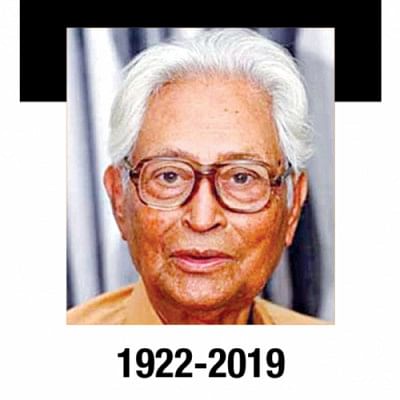Prof Muzaffar passes away

One of the political luminaries of the country Professor Muzaffar Ahmed, also the last surviving member of the advisory council of the Mujibnagar government that led Bangladesh’s Liberation War in 1971, died yesterday due to age-related complications.
Muzaffar, who was the president of Bangladesh National Awami Party (Pro-Moscow NAP) for over five decades, breathed his last around 8:00pm at the capital’s Apollo Hospitals, party joint general secretary Ismail Hossain told The Daily Star.
“We will decide about the final religious rituals of Muzaffar later” Ismail added.
The veteran politician was suffering from age-related complications for the past few years.
He was admitted to Apollo Hospitals on August 14 and shifted to the intensive care unit as his condition deteriorated on Tuesday night.
Prime Minister Sheikh Hasina has expressed deep shock at the death of the veteran politician, reminiscing his contribution to the liberation war and various democratic movements.
“The nation will recall his contribution to progressive politics with honour,” Hasina said.
He is survived by his wife Amena Ahmed, also NAP VP, and daughter Ivy Ahmed.
Muzaffar Ahmed was also a founder of a special guerrilla force comprising the members of National Awami Party (NAP), Communist Party of Bangladesh, and Bangladesh Chhatra Union in 1971.
The leftist politician, who had a political career of more than eight decades, refused to accept Swadhinata Padak in 2015, saying he did politics for the people and the country without expecting any recognition.
He was a forefront leader during the Language Movement, the Liberation War, and the anti-autocrat movements.
Born on April 14, 1922, in Cumilla’s Debidwar, he completed his graduation and post-graduation from the department of economics at Dhaka University with distinction.
He was teacher of the Economics Department of Dhaka University in 1952-54. He left teaching in 1954 to dedicate more time into politics.
Prof Muzaffar started his political career in 1937 by joining leftist students’ organisation Student Federation. He came to the limelight in 1954 when he defeated Muslim League leader Mofiz Uddin in the East Bengal Legislative Election.
He was a pivotal figure in forming the National Awami Party under the leadership of Maulana Abdul Hamid Khan Bhasani in 1957.
As Pakistani military dictator Ayub Khan issued an arrest warrant against him in 1958, he went into hiding. From his hideout, he organised movements against the Ayub Khan regime. He came into open politics after eight years of being in hiding. He became the joint secretary of the undivided Pakistan NAP.
In 1967, he became the president of the-then East Pakistan NAP(Pro-Moscow), as the main NAP was divided on the question of following pro-Soviet and pro-Chinese line. After independence, NAP was later renamed NAP (Pro-Moscow).
He played a leading role during the movement of 1969 to oust dictator Ayub Khan, for which he was put behind bars.
He attended the Round-Table Conference in Rawalpindi in 1969 summoned by Ayub Khan as a leading political figure of the former East Pakistan.
Muzafffar performed duties as one of the members of the six-member advisory council to the provisional government of Bangladesh formed in exile in 1971.
During the Liberation War, he played a significant role in building world opinion in favour of Bangladesh’s independence by taking part in the UN General Assembly.
After the independence of Bangladesh, Muzaffar started to expand his party NAP.
In 1979, he was elected a Member of Parliament. He was also NAP, CPB and other progressive forces’ candidate for the 1981 presidential election. His party NAP joined the ruling 14-party alliance in 2008.
His wife Amina Ahmad was elected as a lawmaker from the reserve seats for women in 2008.
He was barely seen in political activities since the early years of 2000s due to his health condition.

 For all latest news, follow The Daily Star's Google News channel.
For all latest news, follow The Daily Star's Google News channel. 



Comments